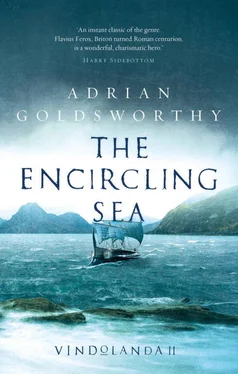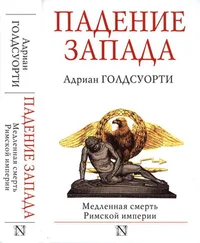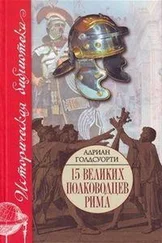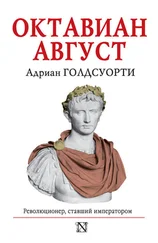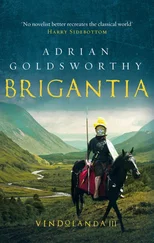Адриан Голдсуорти - The Encircling Sea
Здесь есть возможность читать онлайн «Адриан Голдсуорти - The Encircling Sea» весь текст электронной книги совершенно бесплатно (целиком полную версию без сокращений). В некоторых случаях можно слушать аудио, скачать через торрент в формате fb2 и присутствует краткое содержание. Город: London, Год выпуска: 2018, ISBN: 2018, Издательство: Head of Zeus, Жанр: Историческая проза, Прочие приключения, на английском языке. Описание произведения, (предисловие) а так же отзывы посетителей доступны на портале библиотеки ЛибКат.
- Название:The Encircling Sea
- Автор:
- Издательство:Head of Zeus
- Жанр:
- Год:2018
- Город:London
- ISBN:978-1-784-97816-7
- Рейтинг книги:5 / 5. Голосов: 1
-
Избранное:Добавить в избранное
- Отзывы:
-
Ваша оценка:
- 100
- 1
- 2
- 3
- 4
- 5
The Encircling Sea: краткое содержание, описание и аннотация
Предлагаем к чтению аннотацию, описание, краткое содержание или предисловие (зависит от того, что написал сам автор книги «The Encircling Sea»). Если вы не нашли необходимую информацию о книге — напишите в комментариях, мы постараемся отыскать её.
A FORT ON THE EDGE OF THE ROMAN WORLD cite cite
The Encircling Sea — читать онлайн бесплатно полную книгу (весь текст) целиком
Ниже представлен текст книги, разбитый по страницам. Система сохранения места последней прочитанной страницы, позволяет с удобством читать онлайн бесплатно книгу «The Encircling Sea», без необходимости каждый раз заново искать на чём Вы остановились. Поставьте закладку, и сможете в любой момент перейти на страницу, на которой закончили чтение.
Интервал:
Закладка:
Ferox rode to Syracuse alone. Philo had stayed at Vindolanda to buy supplies that he insisted were essential, and his master did not want to linger. Ferox had been wondering about giving the lad his freedom, but his fussy manner had begun to grate and he decided to leave that for another day. Vindex had gone to see his wife.
‘Greet Cabura for me,’ Ferox said.
‘At least you remembered.’ Vindex sighed. ‘I’ll be back in ten days.’
‘Thought she’d get sick of you long before that.’
‘Nah, she’s not the brightest. Good heart, though.’
Mid-summer had gone and the nights were starting to draw in, so that it was dark by the time Ferox reached the little burgus. The Thracian was in the tower, and his voice was very familiar as they went through the ritual of challenging anyone approaching the outpost.
His quarters were dark and gloomy, and it took a while to find a lamp and get the oil lit. Once it was, he could see that the fatigue parties had given the rooms a rudimentary clean, but nothing close to Philo’s exacting standards. He found some posca, wincing as he drained the first bitter cup, and was prepared for Crescens when the curator arrived to report. The man always stamped and shouted more than was strictly necessary, but there was a familiarity about that as well.
‘Any news?’ Ferox asked after listening to the minor reports.
The curator chewed his lip like a nervous child. ‘Hard to say for sure, sir. But there are rumours.’ Ferox waited and after a moment Crescens made up his mind. ‘I think there is trouble brewing, sir. Big trouble.’
‘There usually is,’ Ferox said, and poured another cup of posca. Then he offered one to the curator. Crescens looked surprised, but took it.
‘Yes,’ Ferox said. ‘There usually is.’
Historical Note
Glossary
About Adrian Goldsworthy
The Vindolanda Series
Non-fiction by Adrian Goldsworthy
An Invitation from the Publisher
Historical Note
During the same summer, a cohort of Usipi conscripted in the German provinces and sent to Britannia committed a great and infamous crime. After killing the centurion and soldiers who were put amongst them to teach discipline, serve as examples and instruct, they seized three light warships…
Tacitus, Agricola 28.THE MUTINY OF the Usipi appears in a single source, Tacitus’ biography of his father-in-law Cnaeus Julius Agricola, legate of Britannia from AD 78–84. His account consists of a single paragraph, and serves a stylistic purpose as a brief interval before he recounts the final year’s campaigning that culminated in Agricola’s victory at Mons Graupius. The text is not well preserved, so that his sense is not altogether clear, but in broad outline the mutineers sailed from somewhere on the west coast of Britain, circumnavigated the island. They raided, but turned to cannibalism, allegedly eating the weakest among them and then others chosen by lot. Eventually they ended up on the coast of north Germany east of the Rhine, where they were killed or enslaved, and some of the slaves were sold into Roman hands and told their story. Depending on the precise dating of Agricola’s operations, the mutiny occurred in AD 82 or possibly 83.
Little is otherwise known about the Usipi. Some of them were part of a group who came into Gaul in 55 BC and were attacked and defeated by Julius Caesar. Their homeland was east of the Rhine and by the end of the first century AD they were not under direct Roman rule, although like most of the peoples beyond the frontier there was presumably some form of treaty relationship. The incident in Tacitus is the only time a unit of Usipi was raised in their own ethnic unit. We do not know the cause of the mutiny and I have embellished the brief story in Tacitus a good deal. He makes no mention of Harii in the unit, but in his discussion of the German tribes, the Germania , he claims that this tribe liked to fight at night, carrying black shields and painting their bodies, relying on the terror caused by their appearance.
Tacitus implies that all the mutineers were killed or enslaved, so it is pure fiction to have one of their stolen ships break away from the others and survive. I have also given them triremes rather than the smaller liburnians in Tacitus’ narrative. This is novel, not a history, so I have felt free to add to the meagre information we have about these years, but have always done my best to set it all within the context of what we do know about Roman Britain, the army and the wider world in this period.
Apart from this short passage from the Agricola , this novel and the others in the series are inspired by the remarkable collection of texts discovered in the excavated forts at modern Chesterholm, once the Roman army base of Vindolanda. These provide fascinating glimpses of life on the frontier of Roman Britain at the very end of the first century and the start of the second century AD. Most deal with the routine and even mundane. There are daily reports made by junior officers of the garrison, requests for leave made by soldiers, accounts of purchases and sales, of goods stored or delivered. Some of the most striking come from the personal archives of the prefect in command of the army unit stationed at the fort, dealing more with their social life than their formal duties. Thus we have a list of food, especially poultry and eggs, consumed in their household to entertain a long succession of guests. We have letters written to and by other commanders, showing the rich social life of these important men. Even more strikingly, we have letters between the wives of these prefects, who accompanied their husbands, whose tour of duty usually lasted for several years. Just as in the more peaceful provinces of the empire, these women supervised the household and the raising of their children in the manner expected of wealthy and well-born wives.
Vindolanda is one of the most remarkable Roman sites in Britain. The first fort was built there in the seventies AD. The fort from our period was the third constructed on the site. The remains visible today are of the later stone fort and the civilian settlement or vicus (a more organised version of the canabae ) outside it. A level of laziness in demolishing the earlier forts when the new ones were built, combined with the water-logged nature of much of the site, created unusual conditions that have allowed the preservation of wood, leather, textiles and other material usually lost. Over five and half thousand shoes have already been found at Vindolanda, more than from anywhere else in the Roman Empire. For more information about the site and the Vindolanda Trust visit the website at http://www.vindolanda.com/.
Although less impressive as objects, the wooden writing tablets were an even more surprising and exciting find. Many are tiny fragments or illegible, but hundreds have preserved some text. Papyrus was known and used in Roman Britain, but was expensive, and much everyday correspondence and record keeping was written in ink on thin sheets of wood. Some were covered in thin wax, so that this could be smoothed down again and re-used, but these tend to be impossible to decipher since scratches from numerous different texts overlap. The most useful were the plain wood sheets, which had been rubbed with only a thin layer of beeswax to prevent the ink from spreading and were then used only once. Even so, little of the ink survives, and it requires careful analysis of the scratches made by the nibs of the stylus pens to trace the outlines of letters. Deciphering the texts and then reconstructing and understanding them is a painstaking business. More detail and many of the texts themselves can be found online at http://vindolanda.csad.ox.ac.uk/.
Читать дальшеИнтервал:
Закладка:
Похожие книги на «The Encircling Sea»
Представляем Вашему вниманию похожие книги на «The Encircling Sea» списком для выбора. Мы отобрали схожую по названию и смыслу литературу в надежде предоставить читателям больше вариантов отыскать новые, интересные, ещё непрочитанные произведения.
Обсуждение, отзывы о книге «The Encircling Sea» и просто собственные мнения читателей. Оставьте ваши комментарии, напишите, что Вы думаете о произведении, его смысле или главных героях. Укажите что конкретно понравилось, а что нет, и почему Вы так считаете.
